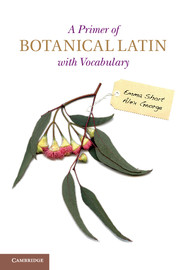Book contents
- Frontmatter
- Contents
- Preface
- Acknowledgements
- Introduction
- Part I Grammar
- 1 The noun
- 2 The adjective and the participle
- 3 The adverb
- 4 The preposition
- 5 The conjunction
- 6 The pronoun
- 7 The verb
- 8 Numerals, measurements (Stearn pp. 107–117)
- 9 Prefixes and suffixes
- 10 Miscellany
- Part II Exercises in translation
- Part III Translating
- Part IV Vocabulary
- References and further reading
- Index
1 - The noun
Published online by Cambridge University Press: 05 April 2013
- Frontmatter
- Contents
- Preface
- Acknowledgements
- Introduction
- Part I Grammar
- 1 The noun
- 2 The adjective and the participle
- 3 The adverb
- 4 The preposition
- 5 The conjunction
- 6 The pronoun
- 7 The verb
- 8 Numerals, measurements (Stearn pp. 107–117)
- 9 Prefixes and suffixes
- 10 Miscellany
- Part II Exercises in translation
- Part III Translating
- Part IV Vocabulary
- References and further reading
- Index
Summary
A noun is the name of a thing, person, place or quality, e.g. plant, Bentham, Australia, air, knowledge, beauty. A generic name is also a noun. A Latin noun has number (singular or plural) and gender (masculine, feminine or neuter). It is declined by changing the ending of the word in order to give different meanings and to show its relationship to other words in a sentence. These endings are called cases. There are five groups, or declensions, of nouns, called simply the First, Second, Third, Fourth and Fifth Declensions. Nouns of a declension form their word endings (cases) in the same way when they are declined. The various endings are attached to the stem of the word, which is the ‘core’ or basic part of a word that remains the same when letters are added to give different cases. The stem of a noun is derived differently according to its declension. To decline a noun fully is to list its forms in all the cases, both singular and plural.
Within a declension there are, for practical purposes, six cases, but for botanical Latin you need to know just five. Then, there are two numbers – singular when there is just one, and plural when there are two or more. The case endings are changed to indicate the plural form. Unfortunately, some case endings are used more than once with different meanings.
- Type
- Chapter
- Information
- A Primer of Botanical Latin with Vocabulary , pp. 3 - 20Publisher: Cambridge University PressPrint publication year: 2013



